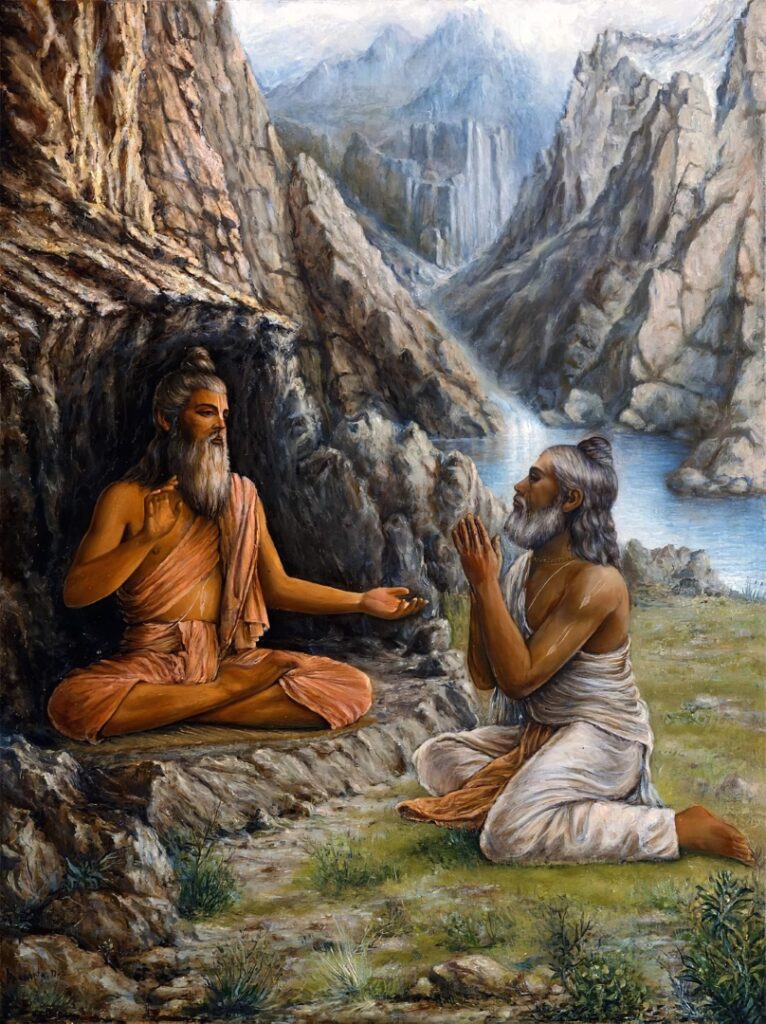Both Vidhura and Dhṛtarāṣṭra were brothers of Pandu, the father of the Pandavas. Dhṛtarāṣṭra was the eldest son, but he couldn’t become the King because he had been blind since birth. Vidhura also couldn’t because the was the son of a maidservant, therefore Pandu became the King.

When Pandu passed away, the crown passed to Yudhisthira, the eldest son. However, Dhṛtarāṣṭra became resentful, desiring that his son Duryodhana would become the king instead. This led him to conspire with Duryodhana, Duḥśāsana, Sakuni, and others, first trying to kill the Pandavas by different means, and later taking the kingdom and sending them into exile by cheating on the dice game. In the process, they also seriously offended Draupadi.
Although Yudhisthira was defeated unfairly in the game, he honored his word and went into exile with his brothers. However, when the time came to get the kingdom back, Dhṛtarāṣṭra and Duryodhana refused. They remained adamant even after many attempts to negotiate the situation, including a personal visit of Krsna to the assembly. With this, the battle of Kuruksetra became inevitable.
Although spiritually blind, Dhṛtarāṣṭra had some trust in his brother Vidhura and thus asked him for advice. Vidhura spoke directly to the point:
“[Vidura said:] You must now return the legitimate share to Yudhiṣṭhira, who has no enemies and who has been forbearing through untold sufferings due to your offenses. He is waiting with his younger brothers, among whom is the revengeful Bhīma, breathing heavily like a snake. Surely you are afraid of him. Lord Kṛṣṇa, the Personality of Godhead, has accepted the sons of Pṛthā as His kinsmen, and all the kings of the world are with Lord Śrī Kṛṣṇa. He is present in His home with all His family members, the kings and princes of the Yadu dynasty, who have conquered an unlimited number of rulers, and He is their Lord. You are maintaining offense personified, Duryodhana, as your infallible son, but he is envious of Lord Kṛṣṇa. And because you are thus maintaining a nondevotee of Kṛṣṇa, you are devoid of all auspicious qualities. Relieve yourself of this ill fortune as soon as possible and do good to the whole family!” (SB 3.1.11-13)
Dhṛtarāṣṭra could not accept the advice and remained silent. Duryodhana then took advantage of the situation to offend his uncle Vidhura and chase him away:
“Who asked him to come here, this son of a kept mistress? He is so crooked that he spies in the interest of the enemy against those on whose support he has grown up. Toss him out of the palace immediately and leave him with only his breath.” (SB 3.1.15)
Vidhura was not attached to life in the palace. On the opposite, he took this situation as an opportunity to go on a pilgrimage to the holy places, understanding it as an arrangement by the Lord.
Vidhura traveled through many different holy places, like Ayodhyā, Dvārakā, and Mathurā, where deities of the Lord were worshiped in the temples. During his pilgrimage, he remained independent, without depending on anyone. He was dressed like a mendicant, without any sign of being part of the royal order, and thus he could travel without being recognized by any of his relatives.
By the time he reached Prabhāsakṣetra, the battle of Kuruksetra had already happened and Yudhisthira had become the undisputed king of the word. There he got news about the death of all his relatives in the fight, except for the Pandavas and his brother Dhṛtarāṣṭra.
Instead of lamenting, Vidhura continued his pilgrimage, passing through the provinces of Surat, Sauvīra, Matsya, and Kurujāṅgala. Then he finally reached the banks of the Yamuna, where he met Uddhava. At this point, Krsna had just left the planet. Both Uddhava and Maitreya were with Krsna under the banyan tree where he was hit by the arrow of Jara. There, Krsna exhibited a four-armed form and transmitted many spiritual instructions to Uddhava, recorded in the 11th canto of Srimad Bhagavatam.
Because Uddhava was a very confidential devotee, Krsna gave him the mission of sharing the knowledge he received with the sages from Badarikāśrama and giving them association. During His pastimes, the Lord had visited many places, but not Badarikāśrama, so He wanted to send His most intimate servitor there, to instruct such dear sages on the perfect path.
When Vidhura met with him, Krsna had already left, and Uddhava was on the way to the Himalayas. Vidhura embraced him and asked for news about the Lord and the Yadhu dynasty, as well as the Pandavas.
Uddhava was engaged in the service of the Lord since the beginning of his life. Even when he was a five-year-old child he was so absorbed that he would forget to eat, and as he grew older, his devotion only increased.
How it was for a great devotee like Uddhava to be left behind after the Lord concluded His pastimes? We can’t imagine, but everything connected with the Lord is auspicious, and thus remembrance of the Lord, even in separation is the source of great ecstasy. In fact, meditation in the Lord in separation is even stronger than when He is physically present, as we can see in the example of the Gopis.
Uddhava narrated some of the pastimes of the Lord to Vidhura and then continued his path to Badarikasrama to deliver the message of the Lord to the great sages.
